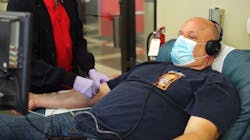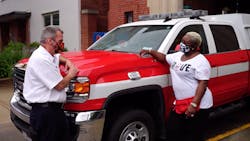DC Firefighters Helping Others after Battling COVID-19
Editor's note: Find Firehouse.com's complete coverage of the COVID-19 pandemic here.
Richard "Sid" Polish didn't think anything when his coffee didn't taste right one day in late April. The D.C. Fire & EMS lieutenant chalked it up to a new brand his fellow firefighters had switched to at the station.
And while he noticed he needed to spice up his food more than normal during lunch, it wasn't a development that had alarmed him initially. Looking back, though, he knows that those signs probably should have.
"Hindsight is 20/20, but I probably had symptoms a couple days before I actually got sick," Polish said.
It wasn't until Polish was on his way to a call that day that he knew what a test would later confirm.
"When I went to get up from my desk, I was completely drained of energy and I broke out in a cold sweat, and I didn't know what was going on," Polish said. "So I got up in the ladder truck and put my mask on and as we're driving, all of a sudden it hit me: the coffee wasn't as good as it was in the morning, the lunch we had, I put extra hot peppers on it because there was no flavor to it. And I realized at that point I was having symptoms."
"I had to add all those things up, and I was, like, 'Guys, I'm sick. We've got to go back to the firehouse, and we have to decon the equipment and I have to go home,'" he added.
Polish is one of more than 100 D.C. firefighters who contracted COVID-19 since March. Now, he and some of his colleagues who recovered from the illness are donating their plasma so that their antibodies could potentially be used to fight the deadly virus. MedStar Health also is using that plasma to conduct a study to see whether it can be used as a treatment for those seriously ill from COVID-19.
"I started reaching out to our folks, 'Hey, let's do something positive to help out' because people are asking us," said Assistant Chief John Donnelly, who has spearheaded the effort after a civilian reached out to the department about donating antibodies for treatment.
Donnelly, who has donated plasma twice, contracted the virus in March. He was the department's eighth confirmed case, but he doesn't know how he became exposed and infected.
Like Polish, Donnelly had started seeing symptoms of the virus that he initially wrote off as something else—in his case, allergies. But like Polish, it was sudden, crushing fatigue that tipped him off that he had picked up COVID-19.
"For me, the experience wasn't too bad," Donnelly said. "At first, it's scary, because you're watching the news and seeing all these people dying and you know the progression of the disease. … So it took a little while for me to get through that. And then you're riding it out like a cold or mono, and you're sleeping a lot."
Both firefighters suffered acute symptoms of the virus, such as a fever and chills. Donnelly, however, never lost his sense of taste or smell but developed facial flushing. Polish struggled with the ups and downs of feeling better one day only to have symptoms come back with a vengeance the next.
"It was a roller coaster," Polish said.
But the symptoms he and Donnelly suffered were nothing compared to those of fellow firefighter Kim Shaw. And while Polish and Donnelly have both fully recovered from COVID-19, Shaw still feels lingering effects from the virus since she was diagnosed in mid-March.
A persistent sore throat was the first symptom she noticed, followed by the overwhelming fatigue and loss of taste and smell.
"I felt real bad and sickly, almost like the flu, but times 100," Shaw said. "Just weak and my muscles were hurting."
Her appetite was gone, as well, and she lost 12 pounds while sick. The fatigue was so bad that she spent the majority of her three weeks with symptoms completely asleep.
"I don't think I was awake enough to realize that I needed to (go to the hospital). My husband said he felt like that. … But I guess I didn't notice it," she said.
Shaw also began experiencing painful headaches that at times force her to lay down until they pass. Medication and other treatments have been unsuccessful at preventing or lessening them, and doctors have been unable to explain them.
A study released last week by researchers at the University College London found that COVID-19 could cause neurological issues, such as strokes, delirium and rare brain inflammation, in patients who didn't suffer severe respiratory trauma. Continued research, though, is needed to gauge any possible long-term brain effects from the virus.
"From what I've been told from my neurologist, there are a lot of people still having symptoms," Shaw said. "They don't have the virus where they can pass it to other people, but they're having long-term symptoms. And (the headaches are) something I just can't get rid of."
While Shaw's husband was concerned with her health while she was sick, Shaw was worried that she would pass COVID-19 along to him and her daughters. She was able to self-quarantine at the top level of the house for a little more than two weeks, with the rest of her family on the lower levels for 16 days.
On the 17th day, believing she was no longer contagious, Shaw went downstairs. Even after more than two weeks, the virus was still able to infect one of her daughters, she said.
"Fortunately, the only thing that happened to her, she just loss her taste and smell. She didn't have any other symptoms," said Shaw, adding that she believes her husband and other daughter also had the virus but were asymptomatic.
Shaw's experiences with COVID-19, which has differed from descriptions commonly given about the effects of the virus, have given her a new perspective on the illness that she intends to take out into the field.
"(Having the virus) will definitely make me more cautious," she said. "We were doing the things they were asking me to do—wear your masks, wash your hands—but it's just going to make me double cautious of what I'm doing. And make sure I'm listening to my patients and make sure that I know that they don't have to have the symptoms that everybody says they have to have COVID."
Some four months later, Shaw still hasn't returned to work. She continues to work to build herself up and hopes to soon be back to at least light duty.
The virus might be temporarily sidelining Shaw from contributing on the job, but it hasn't stopped her from trying to help others suffering from the illness by donating her plasma. She has tired to donate four times already, but various complications, ranging from her blood levels to the inability to find a vein, have postponed that.
"People are in worst shoes than I was, and this is my opportunity to help them get back on their feet and give them another chance at life and then my sickness wouldn't be in vain."
Participating in the MedStar Health Study
MedStar Health is seeking people who tested positive for COVID-19 and are fully recovered to donate plasma for a research project using plasma as a treatment for patients seriously ill from the virus. Anyone who tested positive for COVID-19, fully recovered and is interested in participating in the study can email covidplasma@medstar.net.

